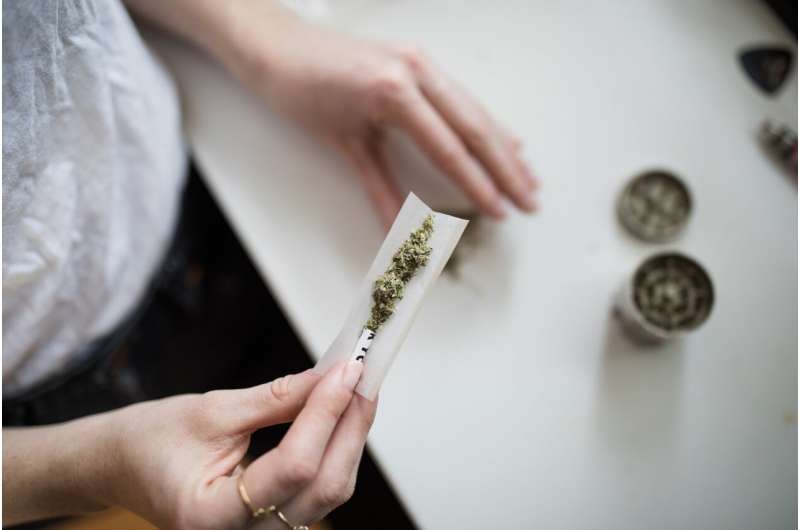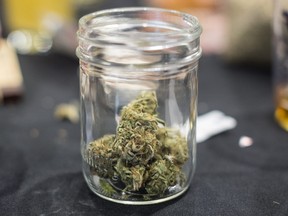Cannabis Medical Use to Alleviate Mental Health Symptoms : Cannabis Use the Cause of Schizophrenia
"Our findings demonstrate an important increase in risk of being diagnosed with schizophrenia after an episode of substance-induced psychosis or substance use without psychosis -- 163 times and ten times higher than the background risk in the general population.""[Canada, which was the second country in the world after Uruguay to legalize cannabis is becoming] the world's laboratory for seeing what happens.""You worry about long-term increases in the number of people living with schizophrenia."Dr. Daniel Myran, assistant professor, University of Ottawa"Frequently, people using cannabis are not aware of the associated risks for their mental health and need to be better informed.""[Substance use is the rule, rather than the exception and people tend to have] zero literacy on the effects of cannabis on mental health.""People should know what they are buying and I don't think that is the case."Marco Solmi, medical director, First Episode Psychosis On Track service, The Ottawa Hospital
 |
| Credit: Unsplash Public Domain |
A new study led by Ottawa researchers -- one of the largest of its kind -- found that people treated in emergency departments with substance-induced psychosis had an 18.5 percent chance of developing schizophrenia within three years of treatment. This is the latest study highlighting mental health risks seen to be associated with the use of cannabis, striking young men in particular. Some Ottawa-area mental health specialists are seeing a "striking increase" in patients with significant psychiatric issues appearing to be linked to cannabis use.
Annual rates of cannabis-induced psychosis increased across the province of Ontario by 220.7 percent between 2014 and 2021.Heightened risk of developing schizophrenia was also seen among those who visited emergency departments for substance use without psychosis. For this group the risk appeared significantly reduced, yet higher than the risk to the general population; 0.1 percent.
The research study which Dr. Myran, a researcher with Ottawa's Bruyere Research Institute, and an assistant professor at University of Ottawa guided, was published in the medical journal JAMA Psychiatry. Brief periods of hallucinations or delusions triggered by substance use or substance withdrawal are the hallmarks of substance-induced psychosis, while schizophrenia is a chronic mental disorder characterized by disruptions in thought processes, perceptions, emotional responsiveness and social interactions.
According to the study, although amphetamine use is a risk factor as well, risk factors for diagnosis with schizophrenia are higher for cannabis than with other substances. Individuals had a 3.7 percent risk of being diagnosed with schizophrenia within three years, who were treated in emergency for amphetamine use without psychosis -- a risk greater than 28 percent higher than the general population. Researchers studied health records of close to ten million people in Ontario between January 2008 and March 2022. They found 407,737 people had visited an emergency department for substance use, among the total.
 |
People who had visited an emergency department with cannabis-induced psychosis held a 26 percent grater risk of developing schizophrenia within three years, a figure 242 times greater than the risk posed to the general population. Males between the ages of 14 and 24 were found to have the highest risk with over 40 percent in that age group who came to an emergency department with cannabis-induced psychosis being diagnosed with schizophrenia within three years.
A sharp increase in emergency room visits for cannabis-induced psychosis in recent years had strong links between cannabis-induced psychosis in young men with schizophrenia, although it is unclear how much of the increase could be related to the legalization of cannabis in 2018, or to other factors; for example the appearance of the pandemic. Dr. Myran spoke of potential policy implications related to these findings, in possibly discouraging the early use of cannabis.
Recommended delaying of the use of cannabis is linked to lower-risk cannabis guidelines until at least age 16, and preferably in the mid-20s. Cannabis use is seen to be highest among people under age 25. 2022 data from the federal government indicates that 27 percent of Canadians used cannabis over the previous year. With youth aged 16 to 19, the rate of use was 29 percent and 50 percent in youth between the ages of 20 and 24. The survey found that 22 percent of people between 16 and 19 and 29 percent between 20 and 24 made use of cannabis at least five days each week.
Mental health specialists are alert to increases in psychiatric issues appearing to be linked to cannabis use. Dr. Jess Fiedorwicz, head of the department of mental health at The Ottawa Hospital, stated that specialists at the hospital had seen a "striking increase" in people presenting with significant psychiatric issues appearing as a result of cannabis use, at a time when surveys indicate a steady trend of increased cannabis use across the country. "We hope this study draws attention to this important but too often ignored public health issue", he pointed out.
"The high risk of cannabis use, particularly for young men, has important implications for public education and policies given global trends of increasing cannabis use and interest in the legalization of cannabis.""I think in general the public is not aware as they could be about the risk."Dr. Daniel Myran, lead author, study on links between drug use and schizophrenia
Labels: Cannabis Use, Hospital Emergency Admissions, Research, Substance-Induced Psychosis, The Ottawa Hospital

0 Comments:
Post a Comment
<< Home